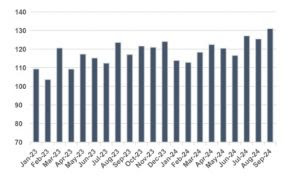Black Friday is approaching and promises to boost Brazilian retail with aggressive discounts and a significant increase in e-commerce sales. For companies, however, this period also brings the logistical challenge of ensuring fast and efficient deliveries while controlling operational costs amid such high demand.
According to E-Marketer estimates, the e-commerce market in Latin America is expected to surpass US$ 250 billion by 2028, with Brazil and Mexico accounting for 86.8% of new digital sales in 2024 alone. In Brazil, Globo's Consumption Panorama reveals that 62% of consumers plan to shop during Black Friday, with free shipping being one of the main purchase motivations for Brazilians.
With this scenario, companies need to equip themselves with tools that offer a competitive advantage, especially in the logistics field. A Geotab, a global connected transportation solutions company, is a strategic partner to face these challenges. Managing over 4.3 million commercial vehicles on its platform, the company offers solutions that combine data analysis and artificial intelligence to optimize logistics operations.
Efficiency and savings: how the power of data and AI tools transform logistics operations
Geotab's solution allows companies to reduce costs by increasing fleet efficiency, such as reducing fuel consumption, idle time, and supporting preventive maintenance measures that minimize vehicle downtime. During Black Friday, when operations are at the limit of capacity, this optimization translates into a faster operation, with quick deliveries and no failures.
The last-mile delivery sector faces an increase in demand during Black Friday, making the use of advanced fleet management solutions essential to ensure speed and efficiency in operations. Companies like Mercado Livre have been using telematics solutions in their operations, achieving significant results in safety and operational efficiency. As a reduction of 42% in total incidents and a reduction of 16% in speeding incidents.
These improvements, combined with real-time fleet monitoring, also allowed the company to increase the autonomy of electric vehicles by 12% in just two months, as well as reduce idle mileage by 37% in one month. These results reinforce how smart fleet management is essential to maximize efficiency and ensure logistics operations can handle Black Friday demand peaks.
“With the continued growth of e-commerce in Latin America, Geotab is positioning itself as a strategic partner for companies that need to overcome logistical challenges during periods of high demand, such as Black Friday, and in daily operations. Our solutions not only offer savings and operational efficiency, but also ensure an exceptional shopping experience for consumers. With access to accurate data and AI tools, companies have the confidence that they are prepared to face increased demand, regardless of its magnitude, and can proactively adjust their operations, avoiding delays and ensuring that deliveries are made on time,” comments Eduardo Canicoba, vice president of Geotab in Brazil.
Promoting safe practices and optimizing fleet maintenance
Geotab also offers driver behavior monitoring solutions, allowing companies to promote safer driving practices, prevent accidents, and help save lives, while optimizing fleet maintenance. The platform offers detailed analyses and performance and collision reconstruction reports, ensuring that companies achieve greater safety and operational efficiency over time.
Anticipating demand and optimizing operational efficiency
During Black Friday, Brazilian consumers are more demanding, seeking early deals, low-cost shipping, and fast deliveries, which leads to demand peaks before the official date. To cope with this pressure, companies need to optimize their logistics operations. Geotab's technology allows for efficient adjustment of operations, reducing fleet idle time and ensuring that vehicles are always in operation.
Focusing onreduce fuel costsRoute optimization and preventive maintenance management prevent unexpected interruptions, allowing fleets to operate at maximum efficiency. "Our commitment is to help companies reduce costs, improve efficiency, and ensure quality service to customers, especially during times of high demand," concludes Canicoba.












